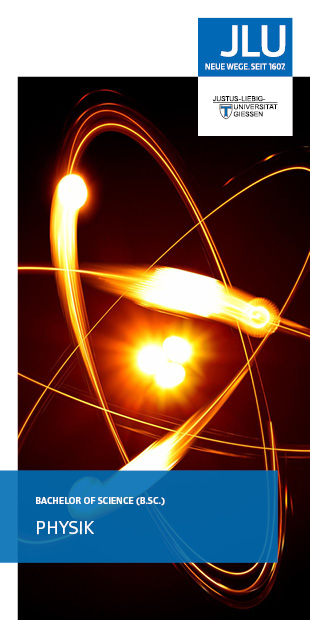Physics (B.Sc.)
Taught in German
Overview
-
Number of enrolled students
224 students are enrolled in this bachelor degree course (as of winter semester 2017/18).
Accreditation
since 23 June 2005.
- Overview
-
Areas of study
"The subject Physics is concerned with the observation and understanding of all basic phenomena in the categories of matter and energy. In this respect it forms the basis of all the other natural sciences right up to life sciences and medicine. It is also the basis for engineering and technology.
In state financed laboratories or laboratories funded by industry, physicists work on basic and on practically oriented problem areas. The subjects range from cosmology to particle physics (mainly dealt with in large international working groups), it continues through the physics of condensed matter and materials and goes on to innovative technology. Physics is the starting point for very promising high technologies, from micro-electronics to nanotechnology and without its regular contributions, effective long term cooperation on solutions to energy and environment problems is unimaginable …." (Deutsche Physikalische Gesellschaft/German Physics Society)
The subject Physics is especially suited for students who wish to understand the connections within and among natural events and also to students looking for technical innovations, i.e. the application of physical principles. Both theoretical-mathematically and constructive-experimentally talented students can find their areas of interest within the subject as theoretical or experimental physicists. Their skills and interests should not be concentrated only on one side of the subject, however. When, for example, a student is only interested in mathematical problems, then he/she should ask him/herself whether he/she should not be studying mathematics. In the same way, a student who likes to construct, tinker and adapt should think about the alternative of studying engineering.Requirements of this course of studies
The student should already have an interest in natural science subjects (in particular physics and mathematics), good basic knowledge, the ability to think analytically and logically, knowledge of English, at the beginning of the course of studies.
A “Vorkurs Mathematik” (preparatory course in mathematics) is offered for all beginners of this course of studies. Participation is emphatically recommended. More on this...
Composition of the Study Programme
- Degree BSc
-
Degree
Bachelor of Science (BSc)
- Duration of studies 6 Semester 180 Credit Points (CP)
-
Duration of Studies
6 Semesters - 180 Credit Points (CP)
- Composition of the Study Programme
-
Composition / Structure of degree programme
In the six semester course of studies students are first given a broad basic training in experimental Physics, Theoretical Physics and Mathematics. This forms the foundation for the broad spectrum in which the professional life and work of the physicist will lie. Based on that a differentiation of the three main aspects of physics is offered after the 5th semester:
- Applied, Experimental and Theoretical Solid State Physics
- Experimental and Theoretical Hadron, Nuclear and Particle Physics
- Experimental Atomic and Molecular physics.
The elective (Wahlpflichtfach – WPF) which is selected from the 1st semester on can be chosen from among the following: Chemistry, Informatics, Numerical Mathematics, Economics, Business Administration.
The non-scientific elective can be selected from among Economics, Business Administration and languages. In the course 180 credit points must be gained, 128 of these in the mandatory section, 30 in the electives, 10 in the study project/special classes and 12 with the Bachelors thesis.Study Plan
1st semester 2nd semester Experimental Physics I
Experimental Physics II Experimental Physics I practical course Experimental Physics II practical course Mathematic methodology for Physics Higher Mechanics
Mathematics for physicists I
Mathematics for physicists II Elective I
Elective II
3rd semester 4th semester Experimental Physics III
Experimental Physics V
Experimental Physics III practical course EDP/ measurement technology Quantum Mechanics Electrodynamics Mathematics for physicists III Computational Physics Experimental Physics IV Experimental Physics VI 5th semester 6th semester Advanced practical course (in the winter semester)
Advanced practical course (in the summer semester) Thermodynamics Theoretical Physics Scientific presenting Experimental Physics Elective III (non-physical) Study Project Elective IV (natural science)
Bachelor's Thesis Examples of possible compulsory elective modules for the compulsory elective subjects I-IV can be found here:
Application
- Commencement of Studies in the Winter Semester
-
Commencement of studies
Only possible in the winter semester
- Entrance Requirements Abitur ohne Praktikumsnachweis
-
Entrance requirements
- Applicants must have an Abitur (German school leaver's examination for university entrance) or equivalent. More on this...
- Certification of a pre-professional practical period is not required.
-
Special regulations apply to foreign applicants or those who gained their university-entrance qualifications abroad. Read more...
- Application not limited only winter
-
-
Application / Enrolment
-
The study programme is not subject to admission restrictions.
-
The enrolment period for the winter semester begins at the beginning of June.
-
The end of the enrolment period is determined anew each year, please enquire in the application portal during the enrolment period.
Different rules apply in some cases for international applicants. More...
-
-
Career Options
- Career Options
-
Programmes of further study at JLU
Master courses of study
Doctorate possible with a Master's degree
Career options / Job market
Physicists are needed and work in parts of industry, research institutions, administration, banks, consulting firms and patent offices, all of which have a particular need for analytical, systematic and synthesizing skills. The chemical industry, energy technology, mechanical engineering, communication technology, ecological technology, management consultation, information technology, etc...
Most physicists find employment in industry, service sectors and universities and tertiary institutions. Industrial physicists in big firms mainly work in research and development. However, they can also find work in production, sales or management. Areas of employment in middle-sized firms have not yet been opened up. Particularly in recent years physicists have become very highly regarded as independent "problem solvers" in the area of communications, in information technology and even in banking. The traditionally broad professional field of the physicist is continually moving through the development of science and technology.
Further Information
- Further Information: Documents
-
PDF documents for the courses of study
- Flyer (in German)
- Study guide (in German)
Examination- and study regulations
- Special regulations (in German)
(with module descriptions and module plans) (in English)
(Please note that only the German version of the modules is offical and legally binding. The english Version is for informative purposes only.) - General study regulations for modular and multi-stage study programmes
Courses offered in the course catalogue
- Electronical course catalogue (in German)
- Bachelor's Degree Programmes of Faculty 07
- International pages
-
Please have a look at our International Pages for more information in English.
- Any Questions
-

Any Questions?
Information- and advisory services of JLU can be found under the category “contact” on this page!
- Help
-
Do you need assistance in choosing the right courses of study?
- Offers: Courses of study
-
Which courses of study suits me best?

Ask Justus offers information for prospective students
Events for prospective students

There is a whole range of events offered by JLU, current events can be found under “news”:
www.uni-giessen.de/studium (in German)
Contact
- Contact
- Subject Advisors
-
-
Prof. Dr. Lorenz von Smekal
Institut für Theoretische Physik
Heinrich-Buff-Ring 16, Raum 420
35392 Gießen
Tel.: 0641 - 99 33300
Lorenz.SmekalProf. Dr. Michael Dürr
Institut für Angewandte Physik
Heinrich-Buff-Ring 16, room 531
35392 Giessen
Tel.: 0641 - 99 33490
-
- Central Study Advisor
- Beate Pitzler
- Central Student Services
-
- Students office →
(for formal matters like matriculation) - Central student advisory office
(advice for students & prospective students) - Hotline Call Justus
(first contact for all matters pertaining to studies) - International office →
(for international students)
- Students office →

